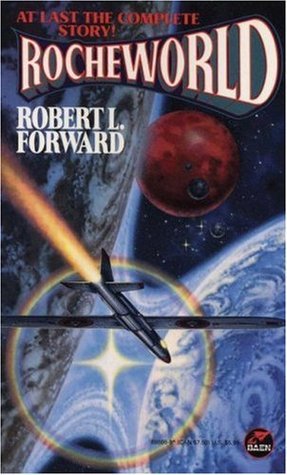What do you think?
Rate this book


470 pages, Paperback
First published April 1, 1984
I don't want to sound like the well-preserved curmudgeon sitting in his rocking chair, bemoaning how it was better in the olden days - I might be one, but I try not to sound like it. Yet reading books like Rocheworld always makes me wonder why no one seems to be writing science fiction like this anymore. By the way, if you happen to know of authors who are writing this kind of material, I would love to know their names. Even the modern science fiction that can be classified as "hard" is just not the same: grittier, darker, dystopian, pessimistic. That's what it seems to come down to, really; books like Rocheworld are optimistic about the future. It's the same reason why the new Star Trek series that came out in the last couple of years don't really feel like Star Trek.
Rather than lamenting the decline of science fiction, we should probably spend time talking about how wonderful Rocheworld is, and why you should absolutely go find a copy as soon as possible. Granted, that may be a little difficult, because it's no longer in print. However, I was able to find a lightly used copy without much difficulty, so I imagine you can, too. Just be sure you look for the complete Rocheworld, and not one of the earlier versions, sometimes titled Flight of the Dragonfly. The book is from back in the days when many science fiction novels were published in short, serialized form in magazines, so Flight of the Dragonfly is about a hundred thousand words shorter than the complete Rocheworld.
This book was added to my reading list last year when I was looking for, of all things, research papers on gravitationally stable planetary formations. It turns out that there is not a lot of content written about hypothetical double-lobed stable close-contact binary planets, and that Rocheworld is one of the few serious treatments. Yes, despite being labeled as science fiction and containing its fair share of fictional elements, I would classify this as a serious treatment of close contact binary planets (sometimes called overcontact binaries, because of the shared atmosphere). If you read it, you will understand why: Robert L Forward was clearly passionate about his particular topic, and did rigorous research, engineering, and mathematics to support the book. There is even an in-world "congressional briefing transcript" at the end that includes engineering diagrams covering the details of the peculiar orbit (a 3:1 resonance orbit, which should sound familiar if you read our TESS post), the construction and layout of the spacecraft, landers, and interstellar laser propulsion system, and the biological characteristics of the peculiar Eau-lobe aliens.
In places, the book almost becomes self-aware, flirting with the "fourth wall." Forward pokes fun at pulp science fiction novels of the time, and flat-out declares that there won't be any distractions from interpersonal drama in this novel. Some people might be disappointed by that, but not me. It's an idea story to the core, and I'm glad that the author didn't try to pollute it with distracting elements. That's not to say that the characters are flat or boring - they have far more personality than the characters in, say, Ringworld - but it does mean that there isn't internal politicking or intra-crew arguments that become a major part of the plot. Everyone is competent, and works well together to accomplish their mission and address whatever external challenges arise.
As I was reading it, I couldn't help thinking how the technologies described for a scientifically semi-viable interstellar mission in this book first published in 1984 are little changed in the past forty years. Everything, with the notable exception of the No-Die drug (which is more of a plot element than a technology, anyway), is still a reasonable extrapolation of current technologies and well-established physical principles. That isn't surprising in and of itself, but what is surprising is that similar, modern works tend to include remarkably similar extrapolated technologies, just with the dates changed. After the breakneck pace of innovation and scientific advances of the twentieth century (someone born in 1900 could very reasonably have grown up walking or riding a horse everywhere, and have been alive to see commercial air travel become commonplace and people walking on the Moon), the twenty first century has so far featured different kinds of innovation. The pace hasn't changed, but the type has. Instead of remarkable innovations in the physical realm, it's probably safe to say that most of the major innovation of the past two or three decades has been cyber-related. This is just something to think about; I don't have a deep and insightful conclusion for this observation.
Some other reviewers of Rocheworld complained it was too scientific, and got too bogged down in details. To those people, I would like to say that I think you are missing the point. If you don't want a scientifically detailed novel, don't pick up a science fiction novel semi-famous for being one of the only serious treatments of overcontact binary planetoids. To everyone else, I would like to say that I really hope you consider adding Rocheworld to your reading list.